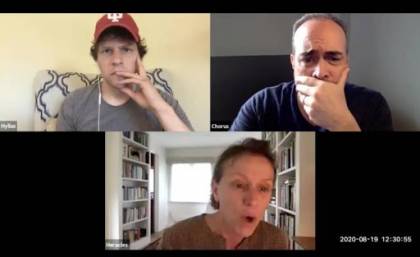Frontline medical workers continue to confront unprecedented professional and personal challenges of the COVID-19 pandemic. From their own inadequate access to personal protective equipment to facing impossible decisions about allocating limited lifesaving resources among their patients, clinicians report experiencing feelings of betrayal, anger, and fear.
Now, by combining one of the pandemic's newest forms of communication—the Zoom webinar—with the ancient art of Greek tragedy, an innovative project is reaching frontline medical workers who may be struggling in isolation, providing them the opportunity to name and share their experiences, connect with colleagues, and access available resources.

Image caption: Actors in the project include Jesse Eisenberg, David Zayas, and Frances McDormand
Image credit: Theater of War Productions
Theater of War for Frontline Medical Providers—developed by Theater of War Productions, the Johns Hopkins Berman Institute of Bioethics, and the Johns Hopkins Program in Arts, Humanities & Health—presents dramatic readings by acclaimed actors of scenes from ancient Greek plays for audiences of frontline medical providers to open up powerful dialogue about difficult subjects.
"We have found that presenting scenes from ancient tragedies about complex ethical situations for frontline medical providers generates an open, non-threatening space in which health personnel can begin to process, interrogate, share, and bear witness to experiences of loss, betrayal, grief, and other forms of moral suffering during the COVID-19 pandemic," wrote Theater of War Artistic Director Bryan Doerries and Berman Institute faculty Cynda Rushton, Jeremy Greene, and Gail Geller in a paper published by The Lancet.
Theater of War for Frontline Medical Providers events begin with a live reading of scenes carefully curated to address themes and issues that medical providers may be facing during the pandemic, such as personal risk, abandonment, deferred grief, deviation from standards of care, helplessness, and complicity in creating suffering. After the performance, the actors are replaced by four panelists—a diverse group of frontline medical providers—who respond to what they heard in the plays that resonated with their own experiences of caring for patients during the pandemic. After the panelists' remarks, a facilitator prompts the audience to join the discussion with a series of questions encouraging reflection and dialogue about themes raised by the plays. The discussion provides an opportunity for the medical workers in the audience to take center stage, sharing the impact of COVID-19 on their lives and finding solace in the community of their peers.
The project premiered on May 24, with 417 clinicians from the Baltimore area logging onto Zoom for a performance featuring Frances McDormand, Jesse Eisenberg, David Strathairn, and Frankie Faison. In a post-performance evaluation, 93% of respondents reported that the program offered new insights about their experience during COVID; 92% said the program made it easier to talk about difficult subjects related to COVID-19. Following that success, the Arts in Health Initiative of the Laurie M. Tisch Illumination Fund provided a grant to fund 10 performances of the project in New York City.
The next performance will take place from 7 to 9 p.m. on Thursday, Nov. 19. Performers will include Academy Award winner Frances McDormand and Frankie Faison.
Posted in Arts+Culture
Tagged berman institute of bioethics, humanities, coronavirus, covid-19







